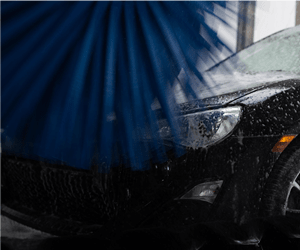
Be Prepared To Stop
April 1, 2016
4 minute ReadTwenty automakers have agreed to a pact with the U.S. government that will lead to automatic-braking systems being standard on most passenger vehicles by Sept. 1, 2022, with larger vehicles that have a gross vehicle weight rating (GVWR) between 8,501 and 10,000 pounds having until September 2025, to comply.
Automatic braking has been available on vehicles for a while now, with mainstream automakers such as Ford, Toyota, and Honda, among others, offering these systems to buyers. But now, the 20 automakers are making a pact with the National Highway Traffic Safety Administration (NHTSA) and the Insurance Institute for Highway Safety (IIHS) to make this technology standard on all new cars.
Automatic-braking systems vary in operation from automaker to automaker, but all use some sort of combination of sensors, radar, laser, or cameras to determine if the driver is about to collide with an object or pedestrian, before applying the brakes if the driver is too slow to react. The maximum speeds at which these systems can operate also varies from company to company.
Overseas, the European Union passed legislation mandating automatic-braking systems on all cars in 2012, but stateside, this pact is voluntary. NHTSA believes this will speed up the usual regulatory process by three years, while the IIHS estimates that 28,000 crashes and 12,000 injuries could be avoided during those three years.
The 20 automakers are Audi, BMW, Fiat Chrysler Automobiles, Ford, General Motors, Honda, Hyundai, Jaguar Land Rover, Kia, Maserati, Mazda, Mercedes-Benz, Mitsubishi, Nissan, Porsche, Subaru, Tesla, Toyota, Volkswagen, and Volvo. These 20 automakers make up 99 percent of the American automotive market.
“It’s an exciting time for vehicle safety. By proactively making emergency braking systems standard equipment on their vehicles, these 20 automakers will help prevent thousands of crashes and save lives,” said U.S. Transportation Secretary Anthony Foxx in a press release. “It’s a win for safety and a win for consumers.”
The pact follows a September 2015 challenge from NHTSA and the IIHS for automakers to make automatic-braking systems (also known as automatic-emergency braking, or AEB, systems) standard.
“IIHS member companies strongly support the adoption of effective safety technologies,” said IIHS Board Chairman and CEO of American Family Insurance, Jack Salzwedel in a press release. “Deploying AEB on a wide scale will allow us to further evaluate the technology’s effectiveness and its impact on insurance losses, so that more insurers can explore offering discounts or lower premiums to consumers who choose AEB-equipped vehicles.”
Pact or not, AEB tech is making its way into cars at a rapid pace – the pact will just speed up the implementation of a feature that would almost certainly be mandated to be standard anyway.
“We’re getting these safety systems into vehicles much faster than what would have been otherwise possible,” said NHTSA Administrator, Dr. Mark Rosekind. “A commitment of this magnitude is unprecedented, and it will bring more safety to more Americans sooner.”
The government agencies have tapped consumer-product publication Consumer Reports to keep an eye on how well automakers are making progress on meeting the deadlines set by the new standard.
“We have been calling on automakers to make automatic emergency braking standard in all new vehicles, and today is an important step toward reaching that goal,” said Jake Fisher, director of auto testing for Consumer Reports. This proven technology is among the most promising safety advances we’ve seen since electronic stability control almost two decades ago. We look forward to working with NHTSA and IIHS to help put this plan into action and hold automakers accountable for their commitments.”
What this means for the car wash industry remains to be seen. These systems could prevent a car from moving forward on the conveyor if the sensors feel they are too close to the car in front of them, but on the other hand, automatic braking systems might prevent slow-speed (and expensive) collisions in the car-wash lot.
Or it could mean absolutely nothing. A Fiat Chrysler spokesman told us this: “The AEB technology available in FCA U.S. vehicles is not active when the vehicles are in neutral. FCA U.S. supports the proliferation of AEB and urges all drivers to consult their owners’ manuals for vehicle operating instructions.”
He further referred to a press release which shows that FCA is now using what’s called “sensor fusion” technology in its AEB systems. This means that the AEB system is now a redundant one in which a camera and radar sensor must agree on the need for the AEB system to engage – in other words, the camera and sensor must agree that a collision is imminent. This redundancy should cut down on false alarms.
While there are variations in the systems offered by the different automakers, if most follow the lead of Fiat Chrysler, this means that vehicles that are in neutral in the wash line shouldn’t run into any trouble. Still, it’s useful to be aware of AEB, in the event the FCA system is not in use and especially for car-wash employees driving vehicles into and out of the line.
Even if most AEB systems are turned off when a vehicle is in neutral, car wash operators still need to be aware of how these systems work, especially for reference in those instances when the vehicle is being driven by the customer or an employee – or in those cases where an employee or drive-thru customer fails to put the vehicle in neutral before entering the machine. While AEB systems shouldn’t appear to be a problem for car-wash owners and operators, knowing how they work is still important.








